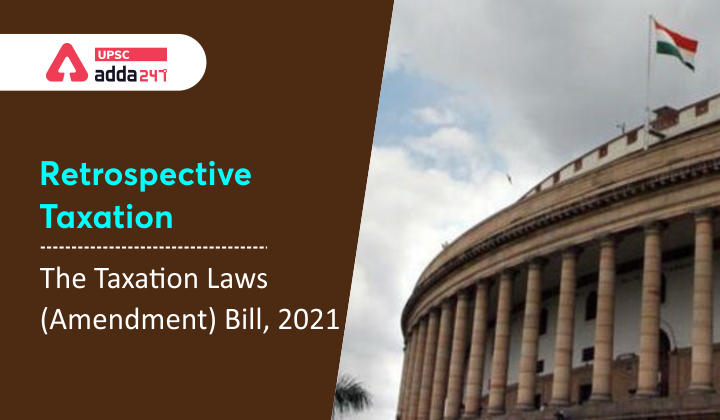Table of Contents
Relevance
- GS 3: Indian Economy and issues relating to planning.
Context
- Rajya Sabha has passed The Taxation Law (Amendment) Bill, 2021 to end all retrospective taxation imposed on indirect transfer of Indian assets, if the transaction was undertaken before May 28, 2012.
- The Bill was passed by Lok Sabha few days ago.
Key points
- Besides amending the Income Tax Act, 1961, it also amends the Finance Act, 2012.
- It prevents the income tax department from raising tax retrospectively.
- After passing the bill, all tax demands that were made on companies like Cairn Energy and Vodafone on indirect transfer of Indian assets prior to May 28, 2012 will be withdrawn.
 Get free video for UPSC CSE preparation and make your dream of becoming an IAS/IPS/IRS a reality
Get free video for UPSC CSE preparation and make your dream of becoming an IAS/IPS/IRS a reality
What is retrospective taxation?
- It is a practice that allows a country to pass a rule on taxing certain products, items or services and charge companies from a time behind the date on which the law is passed.
- It helps countries to correct any drawback in their taxation policies, and stops companies from taking advantage of such ‘loopholes’.
When was the retrospective law introduced?
- It was introduced through the Finance Act, 2012 after Vodafone won a case in the Supreme Court against the I-T department’s demand of ₹11,000 crore in tax dues.
- It became imperative after the Supreme Court ruling of 2012, which stated that gains arising from indirect transfer of Indian assets were not taxable under the existing laws.
- The retrospective tax provisions also applied to Cairn, when it decided to exit India in January 2014.
Implications of retrospective taxation
- It damages India’s reputation as an attractive foreign investment destination.
- India lost both the cases—Vodafone and Cairn—at the Permanent Court of Arbitration.
- Cairn had even applied in courts in the U.S., Canada, Singapore, Mauritius and the Netherlands for seizure of Indian assets such as the state-owned national carrier Air India’s aircraft. It also obtained a legal order in France freezing some real estate assets owned by India in Paris, France.
- It has been considered as a theft sanctioned by law by the foreign companies.
- They hurt company’s sentiments that had unintentionally interpreted the tax rules differently.
Significance of the amendment
- It aims to end long-pending disputes with foreign firms such as Vodafone Plc, Cairn, etc.
- It is seen as an investor-friendly move and could further increase foreign investment in the country.
- Retrospective taxation was one of the major road-block in signing various Bilateral Investment Treaties. The amendment could see streamlining of our constrained economic relations with the favourable countries.
- The havoc wrecked by the COVID-19 needs a comprehensive approach, which includes foreign investment. The amendments will contribute in the recovery of Indian economy.



 TSPSC Group 1 Question Paper 2024, Downl...
TSPSC Group 1 Question Paper 2024, Downl...
 TSPSC Group 1 Answer key 2024 Out, Downl...
TSPSC Group 1 Answer key 2024 Out, Downl...
 Cabinet Ministers of India 2024, New Cab...
Cabinet Ministers of India 2024, New Cab...







